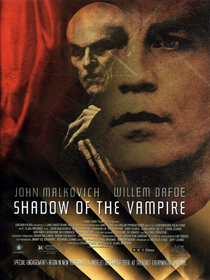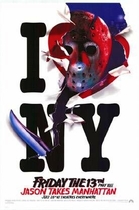Our editor-in-chief Nate Yapp is proud to have contributed to the new book Hidden Horror: A Celebration of 101 Underrated and Overlooked Fright Flicks, edited by Aaron Christensen. Another contributors include Anthony Timpone, B.J. Colangelo, Dave Alexander, Classic-Horror.com's own Robert C. Ring and John W. Bowen. Pick up a copy today from Amazon.com!
Shadow of the Vampire (2000)
Although I desperately try to not look at what anyone else is saying about a film before I write my review--out of a neurotic fear that my opinion will be influenced--I have to use the Internet to look up stats so I can give credit where due and spell the names correctly. While looking up info for Shadow of the Vampire, I couldn't help but notice someone boldly proclaiming it "The Best Film of the Year!" While I think that is extremely overstating its case, Shadow of the Vampire is a very good film, but it happens to straddle a few niches while not really committing (or proceeding flawlessly) to any of them, and my impression is that it may not really satisfy most genre fans.
The story, written by Steven Katz, is a fictionalized account of making the 1922 silent horror film, Nosferatu. After an overlong title sequence featuring pans and zooms in and out of a sepia-toned (to evoke the texture of silent films) illustration that has the length and energy of wading a mile through molasses, director E. Elias Merhige (his only previous work is a film from 1991 entitled Begotten) shows us F. W. Murnau (John Malkovich) at work, directing a scene with Greta Schroeder (Catherine McCormack) and uttering prophetic words to "encourage" her after the shot.
The crux of the story, of course -- and I suppose if you want absolutely no spoilers you should stop reading at this point--is the strange circumstances under which the Nosferatu crew hooks up with Max Schreck, the actor to play the vampire. Only Murnau has met him, and until immediately before taking off for Eastern Europe, only one other person on the crew knows who will play the vampire. Murnau instructs his crew that Schreck is a character actor with "extreme methods," which means that they'll never see him out of make-up, they can only film him at night, etc. There's a good reason for this, as we quickly learn if we haven't deduced it as soon as Murnau gives the above instructions -- "Schreck" isn't really an actor at all; he's really a vampire that Murnau happened to run into while scouting locations.
Although Shadow of the Vampire is sure to be classified as horror, and should be -- it is about a vampire, after all -- it really has more in common with Shakespearean tragedy (not in any literal sense) or something like Taxi Driver, a more modern thematic equivalent. That's not to suggest that it's anywhere near Taxi Driver in quality (not much is), or anywhere near Shakespeare, for that matter, but Shadow of the Vampire is primarily a drama that becomes more disturbingly tragic as it progresses (with a huge arc of this at the end) and it has "art film" written all over it in big letters --take that as you will.
For horror fans, especially those who agree with me that horror should be defined primarily by subject matter and not necessarily mood or the emotions that a film evokes in the viewer, Shadow of the Vampire might thus be a bit of a disappointment. Unlike Nosferatu, it isn't atmospheric and there's nothing to really create the emotion of fear. Most of the film unfolds simply like a fairly straight art-house drama, and in fact, the scenes with Max Schreck as just as often funny.
Worse, there are times towards the middle when Shadow of the Vampire becomes a bit boring. It doesn't take long for the novelty of watching Murnau make the film wear off, and from about the time that Murnau disappears from the scene to fetch Fritz Wagner (Cary Elwes) until they arrive at an island to shoot the final scene of Nosferatu, I was pretty restless. During this period even the novelty of Max Schreck being a real vampire wore a bit thin, tending to play like a stale joke. Still, the ending is worthy of the "masterpiece" accolade, and some of the material that seemed boring makes the ending work better when analyzed in retrospect.
For fans of straightforward drama, Shadow of the Vampire may be a bit too off-kilter for them. While I'm sure they'll appreciate the film to an extent, I'm not sure that watching Schreck do an Ozzy Osbourne with a passing bat won't be too much for them to stomach. If I had to guess who is likely to enjoy this film to the greatest extent, it would be those fans of art-films who tend to dislike Hollywood films just because they're Hollywood films. Again, take that as you will.
As for the performances, they are far above average for the most part. Malkovich plays Murnau like a nut, which is nice, but at times ventures into a kind of overacting (as does Dafoe) that accentuates the campy and humorous aspects. While this might disappoint fans looking for traditional, serious horror qualities, I thought it worked, but I like some campy art-house films, especially the ones that are unintentionally campy--that is, when the filmmakers think they're making great, serious art, but it ends up playing more like Ernest Goes to Africa.
The powers that be behind Shadow of the Vampire pushed up its release date so that it could qualify for the 2001 Academy Awards. While I think that's wishful thinking, and Shadow of the Vampire will not make it on to my list of the top 20 films of 2000, it is worth seeing if you're in the target audiences and especially if you have an interest in the stars or Nosferatu. Just don't expect anything with the ambience of that classic of silent horror.








